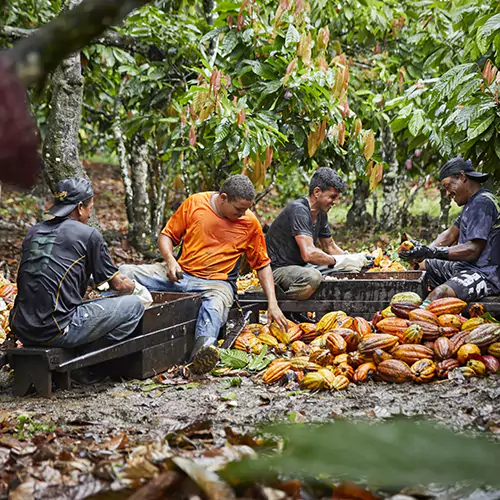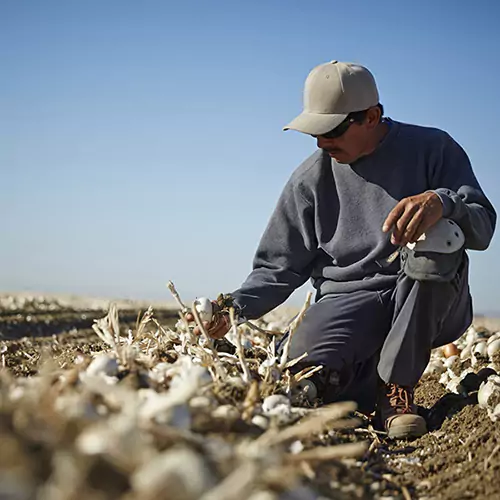Many of the 2.6 million smallholder farmers in our direct and indirect sourcing supply chain battle with low yields, uncertain weather, poor infrastructure and changes in global market pricing. As a result, some tread a fine line between success and failure. They can struggle to break even, let alone grow their businesses. Large-scale farmers, like those from whom we source onions and garlic in the USA, also face challenges regarding climate change, water security and cost of production.
Improving economic opportunities for farmers is critical to building a more sustainable supply chain. Work in this area contributes towards the UN’s Sustainability Development Goal 1 and 2, which aim to end poverty and hunger. We help farmers improve their economic opportunities with agricultural training to increase yields and quality, business training, premium payments, and 0% or low% short, medium and long-term interest loans.
With our customers and other partners, we focus on:
Helping farmers to achieve a better income and closing the gap on living income
Providing training on Good Agricultural Practices
Providing access to finance, agri-inputs like fertilizer and seeds, and labor-saving tools and equipment
Offering business management training and support for farmer collectives and co-operatives
Making sure farmers have access to digital tools that connect them to the business and market information they need
Helping communities to diversify and develop extra sources of income
Goals and progress
We report on our progress in our 2020 annual report. We have also set dedicated strategies and goals for cocoa, coffee, cashew and dairy.
Here’s a snapshot of initiatives and partners we’re involved with to improve economic opportunities for farmers:
Monitoring through AtSource+
AtSource+ allows customers to track metrics related to the economic opportunities of specific farmer groups. These metrics can include:
Average yield of a given farmer group
Number of farmers trained in Good Agricultural Practices and the average change in productivity change for farmers who have completed the training
Number of farmers to receive a Farm Development Plan: personalized advice based on data designed to improve productivity on their farm
Volumes of seeds, seedlings and fertilizer distributed to farmers
Value of farm support equipment distributed
Loans provided to farmers and workers
The AtSource dashboard also allows you to see how metrics change over time so you can understand the impact ofi programs have on farmers’ economic opportunities.
The sweet taste of success
Supplying 250 beehives to Nigerian cashew farmers to bolster income and improve yields.
AtSource+ metrics to track progress:
- Average yield of the farmer group
- Investment ($) in permanent pollinator habitats
Beekeeping can play an important role in growing the income of small-scale cashew farmers. The bees help to pollinate the cashew trees when they are in blossom, boosting yields. While the honey and wax provides additional income for farmers outside of the nut harvest season.
In the Kwara State of Nigeria, ofi has provided 250 beehives to 50 cashew farms, along with protective gear, smokers, harvesting tools and training on how to produce honey and beeswax on their orchards. AtSource+ has been critical to measuring the impact on yields and incomes. As well as monitoring how much ofi and its customers have invested in pollinator habitats like beehives, it tracks the annual yields of the farmer groups involved in the project.
This partnership also connected farmers directly to the market, so they were able to sell 100% of their bee products at a competitive price. Silifatu Ahmed, a cashew farmer in the Owode-Ofaro, Kwara State, has introduced four hives onto her farm and harvested 15kg of honey and 1kg of beeswax in the first year, topping up her income from cashew production by 5%.
Read ofi news
Today Olam Food Ingredients (“ofi”), one of the world’s largest suppliers of ingredients* from almonds to black pepper, has published sustainability targets to tackle the biggest challenges in the global cashew supply chain, starting with farmer livelihoods.
By Arouna Coulibaly, Managing Director Côte d’Ivoire, ofi (olam food ingredients)
Snack bars, spreads, nut-milks, cookies, and other sweet treats; cashew is becoming an increasingly popular ingredient across applications from bakery to beverages, feeding demand for healthier snacking options and plant-based proteins.
- Transparency in Coverage
- Modern Slavery Statement
- CA Supply Chain Transparency Act
- Transparency in Coverage
- Modern Slavery Statement
- CA Supply Chain Transparency Act
Copyright © 2024
Olam International Limited. All Rights Reserved. Co Reg No: 199504676H





